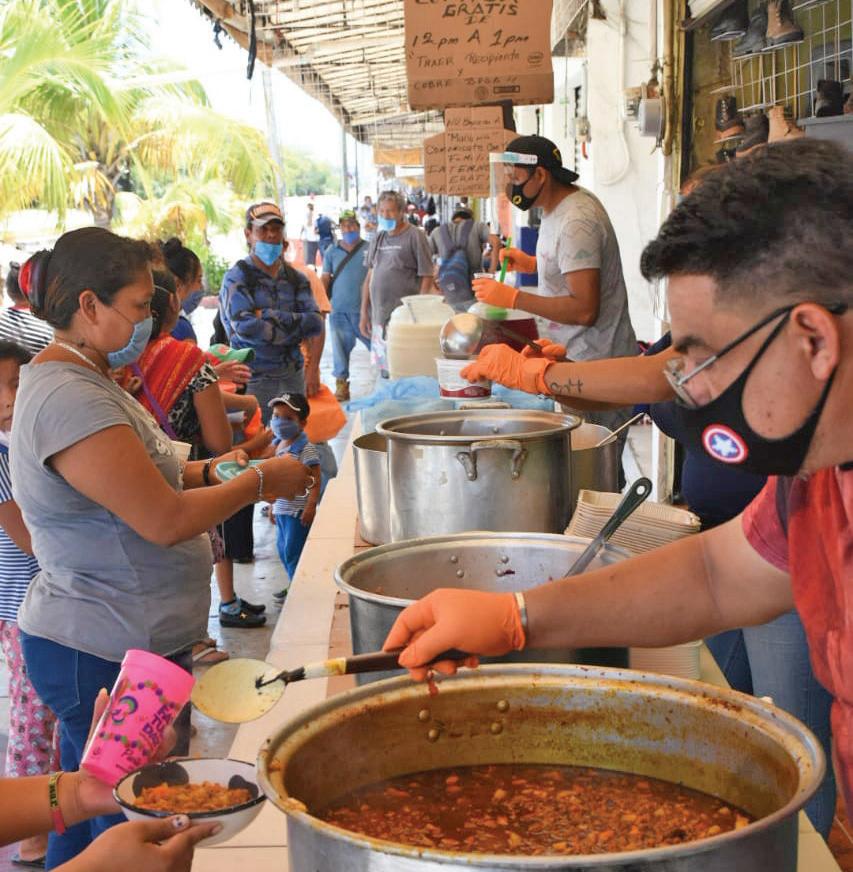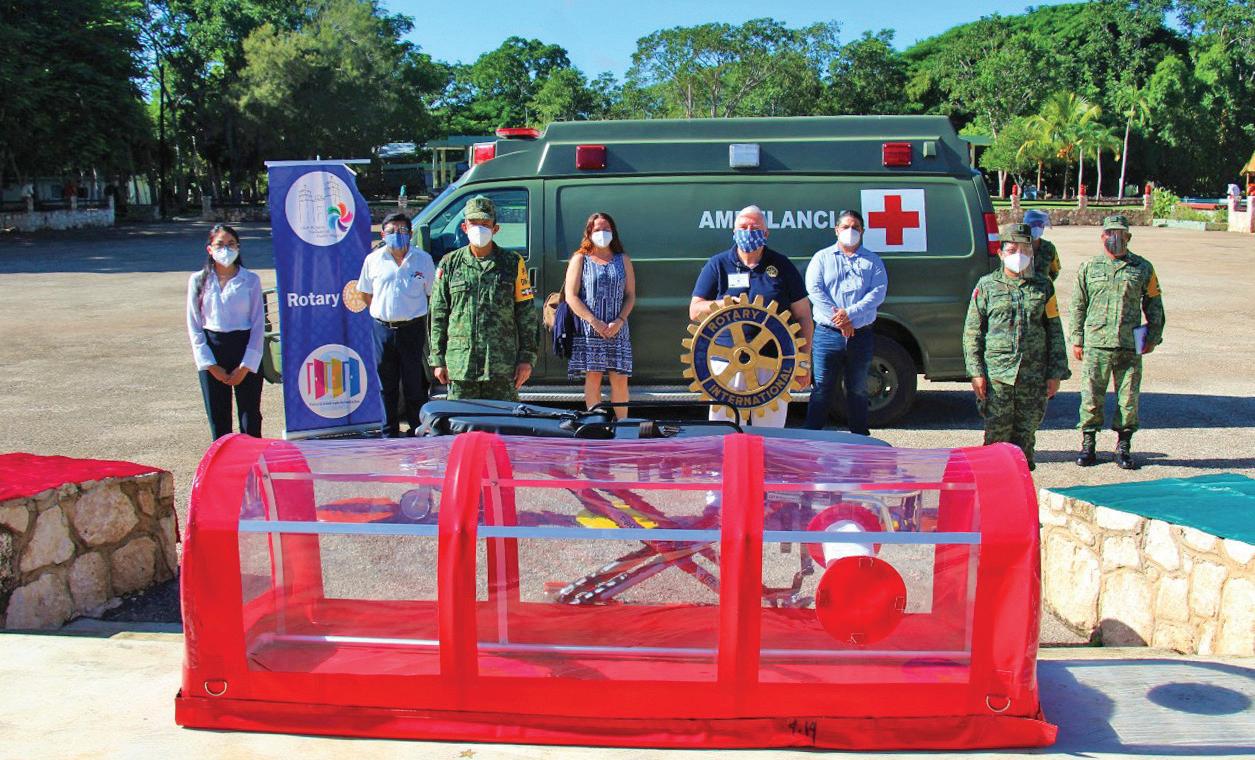
7 minute read
Local heroes

Coming together to help the community during the COVID-19 crisis
Advertisement
This page, Ricardo Villalva opened a community kitchen to feed those hardest hit by the economic crisis
HÉROES LOCALES
UNIDOS PARA AYUDAR A LA COMUNIDAD DURANTE LA CRISIS DEL COVID-19
Esta página, Ricardo Villalva abrió una cocina para alimentar a los más afectados por la crisis
WHEN THE COVID-19 pandemic hit the Mexican Caribbean shutting down the tourism industry and triggering an economic crisis, hundreds of thousands of families faced real hardship from the sudden loss of their livelihood. However, help was at hand. Mexicans come together in a crisis and they did this time too. Throughout the area, they rallied to support charities and church appeals, good Samaritans appeared and there were acts of kindness everywhere.
Support for essential workers
From delivering boxes of masks, disposable gloves and medical overalls to making face coverings and plastic face visors, the community responded to help essential workers in the health sector. In addition to masks and visors, groups like the Rotary Club in Cancun donated digital thermometers, vital signs monitors and sterilizing units. In the state of Yucatán, the Valladolid Rotary Club donated two ambulance capsules to safely transport COVID-19 patients to the hospital.
Community kitchens
Neighbors united to deliver supplies to disadvantaged urban districts and rural communities; kept tabs on vulnerable neighbors, organized food drives and set up soup kitchens. In Puerto Morelos one restaurant teamed up with the local Rotary Club to cook meals for needy families and another group set up a food bank to help 700 low-income families.
However one story captured the attention of Cancún in May 2020. Ricardo Villalva, the owner of a shoe store in El Crucero, the bustling
Cuando la pandemia por el COVID-19 golpeó al Caribe mexicano paralizando la industria turística y desencadenando una crisis económica, cientos de miles de familias enfrentaron dificultades reales por la repentina pérdida de sus ingresos. Sin embargo, la ayuda estaba cerca. Los mexicanos siempre se unen en una crisis y esta vez también lo hicieron. En toda el área, apoyaron a organizaciones benéficas, aparecieron Buenos Samaritanos y hubo actos de bondad en todas partes.
Apoyo para trabajadores esenciales
La comunidad respondió ayudando a los trabajadores del sector salud entregando cajas con cubrebocas, guantes desechables y batas médicas y elaborando cubrebocas y caretas. Además de las máscaras y caretas, grupos como el Club Rotario en Cancún donaron termómetros digitales, monitores de signos vitales y unidades de esterilización. En Yucatán, el Club Rotario de Valladolid donó dos cápsulas para ambulancia para el traslado seguro de pacientes con COVID-19 al hospital.
Cocinas comunitarias
Vecinos se unieron para entregar suministros a distritos urbanos desfavorecidos y comunidades rurales; para estar al pendiente de personas vulnerables, organizaron campañas de recolección de alimentos y montaron cocinas comunitarias. En Puerto Morelos, un restaurante hizo equipo con el Club Rotario para preparar comidas para las familias necesitadas y otro grupo estableció un banco de alimentos para ayudar a 700 familias de bajos ingresos.
Sin embargo, una historia destacó en Cancún en mayo de 2020. Ricardo Villalva, propietario de una zapatería en El Crucero, una concurrida área en el centro de Cancún, transformó su tienda cerrada en un comedor de beneficiencia. Llegó a esta decisión
area where Tulum Avenue meets López Portillo Avenue in Downtown Cancún, put his closed store to work by opening a community kitchen. The sight of an old man going through the trash in search of food was behind his decision. He learned that the man had lost his job and home and hadn’t eaten in five days. Ricardo fed him for two weeks and the man brought 15 to 20 others who were also homeless. Seeing that people in the neighborhood were in dire straits Ricardo was determined to help them. He dug into his own savings to buy food and began to cook and serve meals to those in need.
Ricardo says, “We weren’t allowed to open the store but when I saw that food take out companies could work I got a delivery t-shirt and cap, opened the kitchen and started preparing food. My family pitched in to help. The queue soon stretched as far as the Crucero.”
Word spread and every day for more than 50 days, he and a small group of volunteers fed up to 750 people, including children, senior citizens, the homeless and unemployed building laborers who had been stranded by the crisis and were unable to return to their home villages.
Local residents and charities began to drop off food and donations to keep Ricardo’s kitchen going. Since March 27, he and his volunteers have served 110,000 meals and they are still going. Not only do they feed people who call in at the kitchen, they also go out to deprived neighborhoods on the outskirts of Cancun to distribute donated food, clothing, toys and even crutches and wheelchairs.
Ricardo’s mission is to found a community center with a hostel where people can learn job skills and receive the help they need to get back on their feet.
Several of Ricardo’s volunteers joined him from the food line. Although they were offered their old jobs when lockdown ended, they decided to stay on to help others in need, cooking meals and building the center.
Ricardo is not alone in helping. With donations received from Cancún companies and residents, Ciudad de la Alegría delivered food aid to 40,979 people from April until the end of August. And volunteers at Huellas de Pan A.C. community diner made home deliveries of food to schoolchildren and their families and regular elderly customers during lockdown.
Feeding the forgotten
And amidst the pandemic stray dogs and cats also had their guardian angels. Volunteers in Cancun, Puerto Morelos and Playa del Carmen left food and water while others helped those in financial difficulties look after their pets.
Whatever its scope or size, every community initiative helped someone in need and made a difference tiding them through the worst crisis the Mexican Caribbean had ever seen.
If you would like to support community projects in the Cancun area, learn about the Royal Resorts Foundation and its causes RoyalResortsFoundation.org


Above, the Rotary Club donated supplies to the health sector including special ambulance capsules. Left, Ciudad de la Alegría volunteers delivering food aid
Arriba, el Club Rotario donó equipo al sector salud, como esta cápsula para ambulancias. Izquierda, voluntarios de la Ciudad de la Alegría entregando alimentos
después de ver un anciano esculcando la basura en busca de comida. Descubrió que esta persona había perdido su trabajo y su casa y no había comido en cinco días. Ricardo lo alimentó durante dos semanas y el hombre trajo otras 15 o 20 personas que tampoco tenían hogar. Viendo que la gente se hallaba en una situación precaria, Ricardo se decidió a ayudarles. Recurrió a sus propios ahorros para comprar alimentos y servir comidas a los necesitados.
Ricardo comenta, “No se nos permitía abrir la tienda, pero cuando vi que las repartidoras de comida podían trabajar, me puse una playera y una gorra, abrí la cocina y empecé a preparar comida. Mi familia me ayudó y pronto la fila se extendió hasta el Crucero.”
Corrió la vos y cada día, durante 50 días, él y un pequeño grupo de voluntarios alimentaron a más de 750 personas, incluyendo niños, adultos mayores, personas sin hogar y albañiles sin empleo, quienes habían quedado varados por la crisis y no pudieron regresar a sus pueblos de origen.
Residentes y organizaciones empezaron a entregar alimentos y donativos a la cocina de Ricardo. No solo alimentaban a la gente que llegaba a la cocina, también acudían a las zonas marginadas en las afueras de Cancún a distribuir despensas, ropa, juguetes e, incluso, muletas y sillas de ruedas.
La meta de Ricardo es fundar un centro comunitario con un alberguedonde las personas puedan aprender un oficio y recibir el apoyo que necesitan para ser autosuficientes.
Algunos de los voluntarios de Ricardo se le unieron desde la fila de comida. Aunque les ofrecieron sus antiguos trabajos cuando terminó el confinamiento, decidieron quedarse a ayudar a otros necesitados, preparando comida y construyendo el centro.
Ricardo no está solo en ayudar. Con los donativos recibidos de empresas y residentes de Cancún la Ciudad de la Alegría entregó despensas a 40,979 personas desde abril hasta finales de agosto. Los voluntarios del comedor comunitario Huellas de Pan, A.C. han realizado entregas de alimento durante el confinamiento a niños y sus familias, así como a personas de la tercera edad.
Alimentando a los olvidados
En medio de la pandemia, los perros y gatos de la calle también tuvieron sus ángeles guardianes. Voluntarios de Cancún, Puerto Morelos y Playa del Carmen les dejaban comida y agua mientras que otros ayudaron a vecinos con dificultades económicas a cuidar de sus mascotas.
Cualquiera que sea su alcance o tamaño, cada iniciativa comunitaria ayudó a alguien que lo necesitaba y marcó la diferencia para ayudarle a superar la peor crisis que haya visto el Caribe mexicano.
Si a usted le gustaría apoyar los proyectos comunitarios en la zona de Cancún, saber más acerca de la Fundación Royal Resorts y sus causas, visite RoyalResortsFoundation.org










